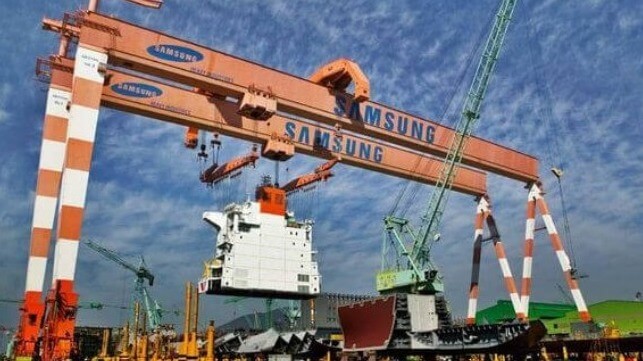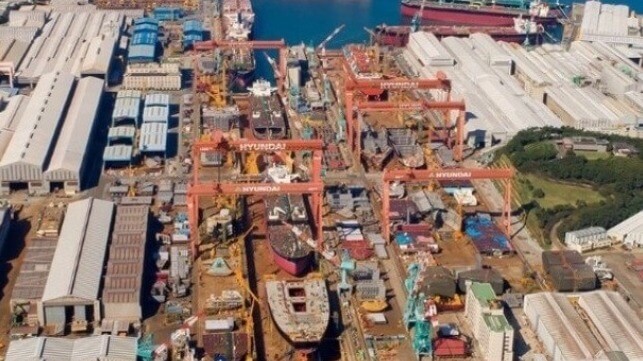Samsung Says Russia’s Zvezda Illegally Terminated $4B Shipbuilding Deal

U.S. sanctions against Russian interests and specifically the listing of the Zvezda shipbuilding complex in 2024 are being cited as the reason behind the cancelation of a roughly $4 billion shipbuilding deal between Zvezda and Samsung Heavy Industries. The Russians' unilateral decision to pull out of the deal came after nearly two years of increasing sanctions by the U.S. and South Korea and the U.S. move earlier this week that included further targeting of the Arctic oil operations.
"The Russian client unilaterally claimed that the contract was not fulfilled during a negotiation process,” Samsung Heavy Industries wrote in a stock exchange filing. “Since the contract termination notice is illegal, we plan to file a complaint with the Singapore Arbitration Court to dispute the illegality of the contract termination and scope of return, while continuing negotiations.”
Samsung Heavy Industries has a long history of working with Zvezda and between 2019 and 2021 celebrated a series of high-profile shipbuilding agreements for the Koreans to design and deliver blocks for tankers that would be completed at Zvezda. The total contracts called for 22 vessels with a combined value of approximately $5.7 billion.
Five vessels under the 2019 contract were delivered, but the 2020 and 2021 agreements were hampered by the increasing sanctions. Samsung was designing the vessels when the first sanctions were imposed after the invasion of Ukraine. Competitor Daewoo Shipbuilding canceled three contracts with the Russians in 2022 citing failure to make installment payments while initially, Samsung Heavy Industries sought to continue its projects.
Samsung Heavy Industries reports in 2022 it invoked Force Majeure, suspending the design work for 10 LNG carriers and seven shuttle tankers. That portion of the contract is reported to be valued between $3.7 billion and $4.2 billion. Samsung reports it discussed future implementation plans for the contract with Zvezda.
When Zvezda was designated by the U.S. in February 2024, Samsung notes it was blocked from working with Zvezda. They said further negotiations were ongoing with the Russian shipowner.
Zvezda filed a notice demanding termination of the contract on June 11. Further, the Russians are demanding the return of $800 million in installment payments already advanced to Samsung Heavy Industries along with interest.
The notice came as the U.S. earlier this week targeted Russia’s planned LNG projects with new sanctions. They included Zevzda, expanding the listing on three Arctic LNG tankers, and in total targeting seven vessels all tied to the LNG operations.
Samsung Heavy Industries in its stock exchange filing said it plans to dispute the termination notice. They will seek arbitration.
Newbuilding Prices Reach Highest Level in 16 Years Driven by Strong Orders

After years of downturn and a soft decade through most of the 2010s, the industry trade group BIMCO reports shipbuilding prices are reaching new highs. Overall order prices are up to the highest point since 2008 having increased a further three percent in 2024. The resurgence comes as some sectors have begun to react to emerging environmental regulations while segments such as tankers returned to newbuild after a long drought.
Chief Shipping Analyst at BIMCO Niels Rasmussen points to the resurgence in orders as helping to drive up prices. The global orderbook he highlights has grown by 72 percent since 2020, reaching its highest level since early 2012. It is up a further two percent year-to-date, which Rasmussen highlights as contributing to a 53 percent increase in prices versus the most recent low in late 2020. Shipyards’ global order book currently stands at 133 million Compensated Gross Tonnage (CGT), an increase of 56 million compared to the order book’s most recent low in late 2020.
“So far this year, the tanker and LNG segments combined have been the main drivers of growth in the global order book,” says Rasmussen. “In addition, the LPG tanker, cruise ship, chemical tanker, and RoRo ship orderbooks have seen double-digit growth. Segments such as cruise began rebounding after the pandemic while LNG is being driven by strong demand and the expansion in Qatar. Tankers had been at a low point due to the prolonged slump in oil markets.
BIMCO highlights that LNG and containerships have accounted for respectively 35 percent and 30 percent of the increase while bulk carriers, tankers, and LPG have accounted for the rest. The orderbook for containerships, however, BIMCO points out peaked during the first quarter of 2023 and has fallen since then although there are expectations that another wave of orders may be coming. Year-to-date, the containership orderbook has fallen 16 percent, as the segment works to absorb its record orders in the past few years. Currently, containerships are deviating from the overall growth trend in shipbuilding orders but the bulk carrier orderbook is also down three percent in 2024.
BIMCO also highlights that the shipbuilding industry was plagued by overcapacity in the last decade between 2010 and 2020. Prices during the 2010s they report only varied +/- 10 percent from the period’s median price. Significant capacity came out of the shipbuilding during the decade which in part has contributed to the longer lead time for deliveries for new orders.
Between 2010 and 2020, Rasmussen calculates that the median order book vs capacity ratio was 2.2, declining to 1.7 during the second half of 2017. Since then, the ratio has climbed from 2.1 in late 2020 to 3.7 currently, the highest since 2010.
This improvement has helped fuel the price increases. The 53 percent price increase in just 3.5 years may seem dramatic says Rasmussen but “it is worth remembering that the average annual price increase between 2010 and 2024 has only been 2.3 percent,” even though manufacturing wages in China have more than tripled.
“Looking ahead, the need to start replacing the large generations of ships built in the 2000s, as well as the need to decarbonize, appear to bode well for future contracting,” says Rasmussen. “Avoiding a massive build-up of shipyard capacity like in the 2000s will be critical if shipyards are to avoid a rise in overcapacity and a scenario where prices fall back to the levels seen in the 2010s.”
This year’s orders have exceeded the forecasts from many analysts who expected a slower pace versus the past few. The South Korean shipyards, however, have reported strong orders while focusing mostly on higher-priced ships and avoiding commoditized segments. HD Korea Shipbuilding & Offshore Engineering for example reported today that it has received orders for a total of 111 ships and one offshore unit, worth $12.11 billion, achieving 89.7 percent of its annual order target of $13.5 billion for 2024.
No comments:
Post a Comment